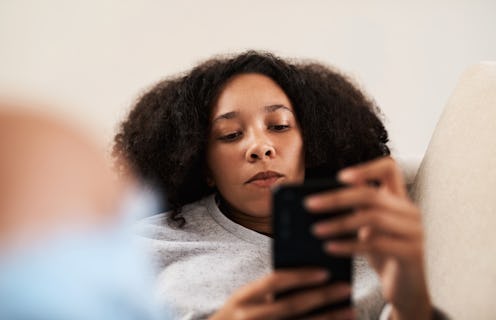Wellness
Experts Explain Why Answering A Text Message Feels So Exhausting Right Now

If your incoming texts are piling up and you can't find the energy to compose a response to even your closest friends, it could be because you're too burnt-out for small talk right now. While your phone used to be a way to wind down at the end of a long, annoying day, in quarantine, they're the primary way many of us are socializing — and that's a lot of pressure. Emotional fatigue might be leaving us too exhausted to text right now, particularly when it comes to basic pleasantries.
"Our brains love to build associations, and right now, people are associating their phones with work. This creates an aversion to the device altogether," Dr. Alexandra Lash, Psy.D, tells Bustle.
"Answering a text message right now may feel too emotionally exhausting because the inherent weight of a text has changed," says licensed therapist and millennial life coach Caroline Given, L.C.S.W.
Before the pandemic, your social life didn't live entirely on your phone, but now, they’re our socially distant social experience. "There is now a sort of implied expectation that electronic communication is supposed to mirror or substitute our in-person relationship dynamic. And that is an inherently draining expectation!" Given explains.
With IRL socializing, Given says, it's easier to get a sense of our limits. If we are feeling physically tired, we don't go out. If we are feeling too overwhelmed or stressed with external factors, we limit our interactions and turn our energy inward. But with texting, it's harder to recognize those boundaries. "We don’t expect our friends or work colleagues to be available to speak with us in person 24/7 because that isn’t physically possible, but it is technically possible via text," she says. "And the idea of participating in an endless stream of communication is exhausting."
The inherent weight of a text has changed.
Before the pandemic, we didn't rely on text messages as heavily as we do now, and it was OK to be brief or elusive here and there. "We might have felt more free to send out sparse texts because we knew our in-person communication would ultimately provide emotional context to the recipient," Given says. "Now that the option of an in-person meet up is off the table, we may feel an added burden to infuse our messages with detail and emotion in order to compensate." In essence, there's more pressure on texting now.
It's also harder to articulate your feelings via text — finding the right words to type might be less natural than speaking freely. On top of the effort, a detailed text conversation holds you more accountable for your words than an IRL conversation. "Your words are potentially archived forever in a digital cloud or screenshot, which is basically the proverbial knife hanging over the head of all tech-savvy young people," Given adds.
And when you take into consideration that people are confronting a global health crisis, a crumbling economy, record unemployment rates, and profound evidence of systemic racism, it's hard to talk about the weather or update someone on your relationship drama. "A lot of my clients are feeling that there is so much to attend to emotionally, that it's more trying than usual to converse on a superficial level," Dr. Lash explains. Basically, it can be hard to not only talk about the feelings we have regarding our personal lives, but it can be difficult to even give weight to our personal lives when so much is wrong in the world. "People might feel their problems don't matter because people are being killed, and there are so many emotions and so much guilt about even having those emotions," Dr. Lash adds, going to say that though it's hard, we should "have relativity" and allow ourselves to speak about our personal struggles, so long as we "hold onto perspective."
What was once a second-nature mode of mindless communication has now become a weighted, complicated, and exhausting tool that many are not eager to reach for. So if you've noticed a lot of unanswered texts, don't take it personally. Instead, try picking up the phone for a call. It's not you — it's just too much to text.
Sources:
Dr. Alexandra Lash, Psy.D, clinical psychologist practicing in Portland, Maine.
Caroline Given, L.C.S.W., clinical therapist, social worker, and life coach practicing in Central Florida.